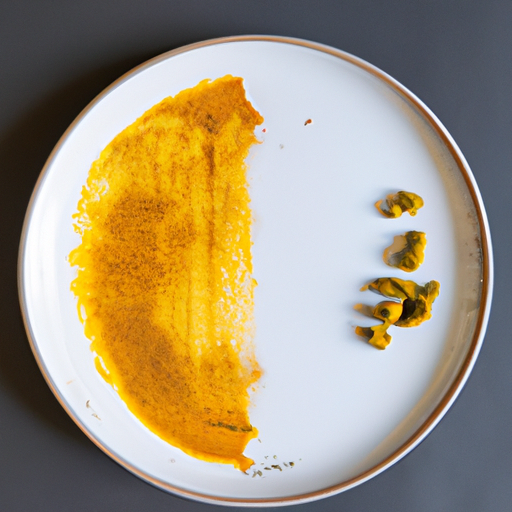As a regular consumer of turmeric tea, I couldn’t help but notice a change in the color of my urine after drinking it. This made me curious – does turmeric tea actually alter the color of urine? And if it does, should I be worried?
In this article, we’ll explore the science behind turmeric tea and urine color, as well as whether or not this color change is something to worry about.
First, it’s important to understand what turmeric tea is. Turmeric is a spice that has been used for thousands of years in traditional medicine and cooking. It contains a compound called curcumin, which has been found to have anti-inflammatory and antioxidant properties. Turmeric tea is made by steeping turmeric root or powder in hot water, often with other spices and ingredients like ginger, cinnamon, and honey. It has become increasingly popular in recent years as a health-promoting beverage.
Key Takeaways
- Turmeric tea contains curcumin, which can cause a yellowish-orange color in urine after consumption.
- The color change is harmless and typically lasts for a day or two, depending on the amount of turmeric consumed.
- Understanding urine color interpretation is important for healthcare providers, as changes in urine color can be a sign of serious medical conditions.
- Consuming turmeric tea and incorporating turmeric into meals can provide health benefits, such as reducing pain and swelling, improving brain function, and potentially having anticancer effects.
Understanding Turmeric Tea
Turmeric tea is a flavorful and healthy beverage made with turmeric, which can give a vibrant yellow color to the drink. This tea has been used for centuries in traditional medicine to treat a variety of ailments, such as inflammation, digestive issues, and even depression. The benefits of turmeric tea come from its active ingredient, curcumin, which has anti-inflammatory and antioxidant properties.
To prepare turmeric tea, you’ll need to boil water and add fresh or ground turmeric. You can also add other ingredients such as ginger, honey, or lemon to enhance the flavor. After simmering for a few minutes, strain the tea and enjoy it hot or cold. It’s important to note that turmeric can stain clothes, so be careful when handling it.
Now, let’s move on to the science behind urine color.
The Science Behind Urine Color
You may have noticed that the shade and hue of your urine can vary depending on many factors such as hydration levels, diet, and overall health. Urine color interpretation is an essential tool for healthcare providers to assess a patient’s health status.
Here are some interesting facts to consider when interpreting the color of your urine:
- Hydration and urine color are closely related. Darker urine indicates dehydration, while lighter urine suggests adequate hydration levels.
- Certain foods and medications can change the color of your urine. For example, beetroot can cause urine to turn pink or red, while vitamin B supplements may turn urine bright yellow.
- Liver and kidney diseases can cause urine to become dark brown or orange.
- Urine color can also change due to exercise, hormonal changes, and stress.
Understanding the science behind urine color can help you identify potential health issues. In the next section, we’ll explore whether turmeric tea can cause changes in urine color.
Turmeric and Urine Color
I’m excited to talk about the effects of curcumin, the active ingredient in turmeric, on urine color.
Curcumin is known for its anti-inflammatory and antioxidant properties, but it can also affect the color of urine.
Drinking turmeric tea or taking supplements containing curcumin can cause urine to turn a bright yellow or orange color, which is completely normal and harmless.
It’s important to understand how turmeric can affect urine color so that you don’t become alarmed if you notice a change after consuming it.
Curcumin and Its Effects
Although it’s a natural compound found in turmeric, curcumin has been shown to have a powerful impact on reducing inflammation in the body. However, curcumin’s absorption and bioavailability can be limited, which can reduce its effectiveness. To improve curcumin absorption, it’s often recommended to consume it with black pepper or with healthy fats such as coconut oil.
Turmeric tea can also be beneficial for digestive health due to its anti-inflammatory properties. It has been shown to help reduce symptoms of digestive disorders such as irritable bowel syndrome and ulcerative colitis. Additionally, turmeric tea can aid in the prevention of chronic diseases such as heart disease and diabetes. Its ability to lower inflammation in the body and improve insulin sensitivity may contribute to these health benefits.
Moving on to the topic of how turmeric can affect urine color, it’s important to note that curcumin in turmeric can cause urine to turn yellow or even orange in some individuals.
How Turmeric Can Affect Urine Color
Feeling a little surprised when you go to the bathroom after consuming turmeric? It’s not uncommon for your pee to take on a vibrant hue due to the presence of a certain compound found in the spice.
Curcumin, the active ingredient in turmeric, is responsible for the yellowish-orange color that may be noticeable in urine. The color change is harmless and typically lasts for a day or two.
However, it’s important to note that the extent of color change may vary depending on the amount of turmeric consumed. If you’re taking a high dosage of turmeric supplements or drinking large amounts of turmeric tea, the color of your urine may be more intense.
Additionally, hydration levels can also play a role in the color change, as dehydration can cause urine to become more concentrated and therefore more yellow. With this in mind, it’s important to stay hydrated and consume turmeric in moderation.
Is the color change normal? Let’s explore further.
Is the Color Change Normal?
I’ve noticed that my urine color has been bright yellow or even orange lately, and I’m wondering if it’s normal.
After doing some research, I learned that certain foods, medications, and vitamins can cause urine to change color.
Bright yellow or orange urine can be a normal and harmless side effect of taking certain supplements or eating certain foods, but it’s important to know when it could be a sign of a more serious health issue.
Understanding Bright Yellow and Orange Urine Color
Bright yellow or orange urine color can be a sign of dehydration or the consumption of certain foods or beverages, such as turmeric tea. While it may be alarming to see such a bright color, it’s usually not a cause for concern. Here are some things to keep in mind if you notice your urine is a bright yellow or orange color:
-
Dehydration: When you’re dehydrated, your urine becomes more concentrated, resulting in a darker color. Make sure you’re drinking enough water throughout the day.
-
Vitamin B supplements: Taking vitamin B supplements can cause your urine to turn a bright yellow color.
-
Carrots and sweet potatoes: These foods are high in beta-carotene, which can give your urine an orange tint.
-
Certain medications: Some medications, such as rifampin and phenazopyridine, can cause your urine to turn a bright color.
-
Turmeric tea: Consuming turmeric tea, which is known for its bright yellow color, can also affect the color of your urine.
It’s important to note that while bright yellow urine can be a normal occurrence, it’s still important to pay attention to your hydration levels and any other symptoms you may be experiencing.
In the next section, we’ll discuss when to be concerned about changes in urine color.
When to Be Concerned
In the previous subtopic, we discussed how bright yellow and orange urine color can be caused by certain foods and medications. However, it’s important to know when to be concerned about changes in urine color.
One possible culprit of changes in urine color is turmeric tea. Turmeric is a spice commonly used in Indian and Middle Eastern cuisine and has been gaining popularity as a supplement due to its anti-inflammatory properties. However, consuming large amounts of turmeric can turn urine yellow or orange. This is because turmeric contains a pigment called curcumin, which can be excreted in urine. While this is generally harmless, it’s important to note that changes in urine color can also be a sign of a more serious medical condition.
Therefore, if the change in urine color is not due to consuming turmeric or other known factors, it’s important to consult a healthcare provider. Other factors that can affect urine color include dehydration, hydration, and underlying medical conditions.
In the next section, we’ll explore these factors in more detail and how they can impact urine color.
Other Factors That Can Affect Urine Color
Other factors that can affect urine color include hydration levels, medications, and certain medical conditions. Dehydration can cause urine to become more concentrated, leading to darker yellow or amber colors. On the other hand, being well-hydrated can result in lighter, more diluted urine.
Medications such as rifampin, phenazopyridine, and certain chemotherapy drugs can also impact the color of urine, causing it to turn orange, red, or green.
Aside from dehydration and medication impact, certain medical conditions can also affect urine color. Liver disease, for example, can cause urine to become dark brown or even black. Rhabdomyolysis, a breakdown of muscle tissue, can lead to reddish-brown urine. Finally, blood in urine, known as hematuria, can cause pink or red urine.
It’s important to note that these conditions are rare and that changes in urine color can often be attributed to simple, benign factors like dehydration or medication use.
Understanding the various factors that can impact urine color is important in knowing how to monitor changes in your own urine. By paying attention to your hydration levels and any medications you may be taking, you can get a better sense of what’s normal for you. If you notice any sudden or persistent changes in urine color, however, it’s always a good idea to consult with a healthcare professional.
How to Monitor Urine Color
Monitoring your urine color is a simple but effective way to track your hydration levels and potentially catch any underlying medical conditions early on. The color of your urine can indicate how hydrated you are and if there are any potential health concerns.
It’s important to drink enough water throughout the day to maintain a healthy urine color. The ideal urine color is a pale yellow or straw color, which indicates that you’re well-hydrated.
Common urine color changes include dark yellow or amber, which may indicate that you’re dehydrated and need to drink more water. If your urine is a bright or neon yellow, it may be a sign that you have consumed too much vitamin B2 or B12.
Certain medications and medical conditions can also affect urine color, so it’s important to speak with your healthcare provider if you notice any sudden changes in your urine color.
As we move forward, let’s explore some tips for consuming turmeric tea to see if it has any impact on urine color.
Tips for Consuming Turmeric Tea
To get the most out of your turmeric tea, it’s important to consider adding a pinch of black pepper. This can increase the bioavailability of curcumin, the active ingredient in turmeric, and enhance the potential health benefits of the tea.
Additionally, using fresh turmeric root instead of dried powder can also increase the potency of the tea.
When brewing turmeric tea, it’s important to use boiling water to extract the maximum amount of curcumin. Steeping the tea for at least 10 minutes can also enhance its potency. However, be mindful that consuming excessive amounts of turmeric tea can cause digestive discomfort and turn your urine a yellow or orange color.
With these tips in mind, enjoy the potential health benefits of turmeric tea with caution.
As an alternative to consuming turmeric tea, there are other ways to incorporate this powerful spice into your diet.
Alternative Ways to Consume Turmeric
If you’re looking for alternative ways to add more of this potent spice to your diet, try sprinkling turmeric on roasted vegetables or mixing it into a homemade salad dressing. Turmeric can also be incorporated into various recipes, such as curries, soups, and smoothies. Additionally, turmeric supplements are available in various forms, including capsules, powders, and tinctures. These supplements are a convenient way to consume turmeric, especially for those who may not enjoy the taste of turmeric tea.
To give you an idea of the versatility of turmeric in cooking, here’s a table of turmeric-infused recipes that are easy to make and packed with flavor:
| Recipe | Ingredients | Instructions |
|---|---|---|
| Turmeric Roasted Cauliflower | Cauliflower, turmeric, olive oil, salt, pepper | Preheat oven to 400°F. Toss cauliflower florets with turmeric, olive oil, salt, and pepper. Roast for 25-30 minutes. |
| Turmeric Golden Milk | Turmeric powder, milk, honey, cinnamon, ginger | In a small saucepan, heat milk and turmeric powder over medium heat until warm. Add honey, cinnamon, and ginger. Whisk until combined. |
| Turmeric Quinoa Salad | Quinoa, turmeric, cucumber, cherry tomatoes, red onion, lemon juice, olive oil, salt, pepper | Cook quinoa according to package instructions. In a separate bowl, mix turmeric, lemon juice, olive oil, salt, and pepper to create dressing. Mix together cooked quinoa, cucumber, cherry tomatoes, and red onion. Pour dressing over salad and toss until coated. |
Incorporating turmeric into your diet doesn’t have to be limited to just drinking turmeric tea. With the variety of turmeric recipes and supplements available, there are plenty of ways to reap the health benefits of this spice. Moving forward, let’s explore other health benefits of turmeric.
Other Health Benefits of Turmeric
Adding turmeric to your meals can help boost your overall health. It’s been shown to have anti-inflammatory properties that can reduce pain and swelling in the body. Turmeric has also been linked to a variety of other health benefits. Here are just a few:
-
May improve brain function: Turmeric contains a compound called curcumin, which has been shown to have neuroprotective properties and may help improve memory and cognitive function.
-
May lower risk of heart disease: Some studies suggest that turmeric may help improve blood flow and reduce inflammation, both of which are associated with a lower risk of heart disease.
-
May have anticancer effects: While more research is needed, some studies suggest that curcumin may have anticancer properties and could help prevent the growth and spread of cancer cells.
-
May improve digestion: Turmeric has long been used in traditional medicine to aid in digestion, and some studies suggest that it may help reduce symptoms of irritable bowel syndrome (IBS) and other digestive disorders.
-
May help manage arthritis: Due to its anti-inflammatory properties, turmeric may help reduce pain and swelling in individuals with arthritis.
While adding turmeric to your cooking can be a simple and delicious way to incorporate it into your diet, some individuals may also choose to take turmeric supplements. It’s important to talk to your healthcare provider before starting any new supplement regimen, as turmeric may interact with certain medications and could have potential side effects.
Frequently Asked Questions
Can turmeric tea cause any adverse effects on the body?
As someone who enjoys turmeric tea, I can confidently say that it has numerous potential benefits, such as reducing inflammation and improving brain function. However, like with any other food or drink, there are also potential risks associated with consuming too much. It’s important to drink turmeric tea in moderation and consult with a healthcare professional if you have any concerns.
How often should I consume turmeric tea to see a noticeable change in urine color?
To see a noticeable change in urine color intensity, I recommend drinking turmeric tea daily or every other day. However, it’s important to note that urine color can also be affected by other factors, such as hydration levels and medication.
Are there any precautions I should take before consuming turmeric tea?
Before consuming turmeric tea, it is important to take precautionary measures such as consulting with a healthcare provider. It is recommended to start with a low turmeric dosage and gradually increase to prevent any adverse effects.
Does the urine color change caused by turmeric tea indicate any underlying health conditions?
If urine color changes after consuming turmeric tea, it may indicate underlying conditions such as liver or kidney problems. A urine analysis can determine the cause and any necessary treatment.
How long does the urine color change caused by turmeric tea last?
The duration and intensity of urine color change caused by turmeric tea varies. It can last from a few hours to days and intensity depends on the amount of turmeric consumed. It is generally harmless.
Conclusion
Overall, turmeric tea can be a great addition to a healthy diet and lifestyle. It has numerous health benefits, including anti-inflammatory properties and potential cancer-fighting abilities. However, it’s important to be aware of the potential for turmeric to change the color of your urine. While this isn’t necessarily concerning, it’s important to monitor your urine color and make note of any changes.
Aside from monitoring urine color, there are various tips for consuming turmeric tea, such as adding black pepper to increase absorption and drinking it in moderation. Additionally, there are other ways to incorporate turmeric into your diet, such as using it as a spice in cooking or taking it in supplement form.
Ultimately, the decision to consume turmeric tea or incorporate turmeric into your diet should be based on individual preferences and health goals.










